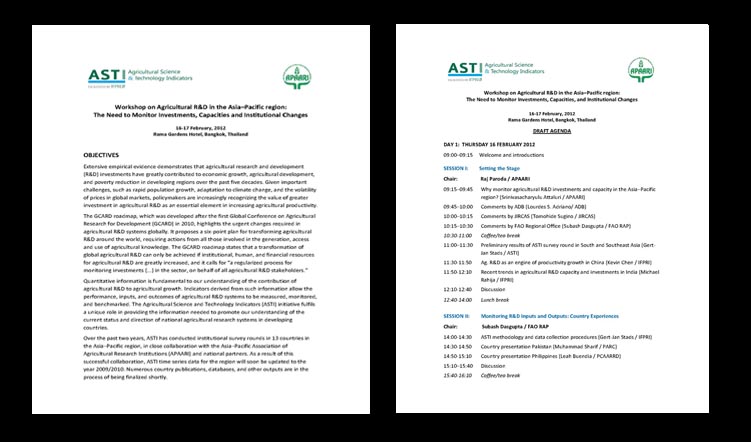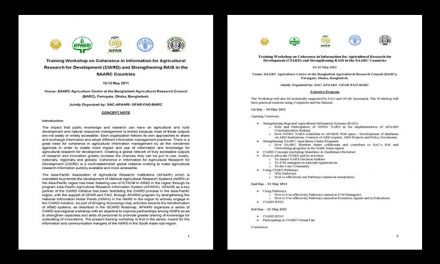OBJECTIVES
Extensive empirical evidence demonstrates that agricultural research and development (R&D) investments have greatly contributed to economic growth, agricultural development, and poverty reduction in developing regions over the past five decades. Given important challenges, such as rapid population growth, adaptation to climate change, and the volatility of prices in global markets, policymakers are increasingly recognizing the value of greater investment in agricultural R&D as an essential element in increasing agricultural productivity.
The GCARD roadmap, which was developed after the first Global Conference on Agricultural Research for Development (GCARD) in 2010, highlights the urgent changes required in agricultural R&D systems globally. It proposes a six-point plan for transforming agricultural R&D around the world, requiring actions from all those involved in the generation, access and use of agricultural knowledge. The GCARD roadmap states that a transformation of global agricultural R&D can only be achieved if institutional, human, and financial resources for agricultural R&D are greatly increased, and it calls for “a regularized process for monitoring investments (…) in the sector, on behalf of all agricultural R&D stakeholders.”
Quantitative information is fundamental to our understanding of the contribution of agricultural R&D to agricultural growth. Indicators derived from such information allow the performance, inputs, and outcomes of agricultural R&D systems to be measured, monitored, and benchmarked. The Agricultural Science and Technology Indicators (ASTI) initiative fulfils a unique role in providing the information needed to promote our understanding of the current status and direction of national agricultural research systems in developing countries.
Over the past two years, ASTI has conducted institutional survey rounds in 13 countries in the Asia–Pacific region, in close collaboration with the Asia–Pacific Association of Agricultural Research Institutions (APAARI) and national partners. As a result of this successful collaboration, ASTI time series data for the region will soon be updated to the year 2009/2010. Numerous country publications, databases, and other outputs are in the process of being finalized shortly.
In order to discuss the outcomes of the recent survey round in South and Southeast Asia and to discuss the way forward, ASTI and APAARI are hosting a workshop in Bangkok on 16 and 17 February 2012. Representatives of national partner organizations, regional organizations, and other stakeholders will be invited to participate at this important workshop. The objectives of the workshop include:
- Discuss recent trends and challenges in investments, capacity, and the institutional setup of agricultural R&D in the Asia–Pacific region.
- Discuss strategies on how agricultural R&D indicators for the Asia–Pacific region can be widely disseminated and used to better advantage for advocacy, as well as priority and policy setting purposes at the national and regional level.
- Discuss ways forward to continuously monitor and benchmark investments, capacity, and the institutional setup of agricultural R&D in the Asia–Pacific region.
APAARI-ASTI Workshop Agenda and List of Participants (2820 downloads)



